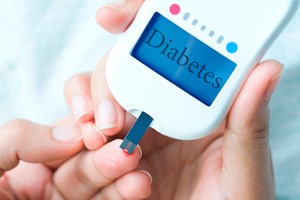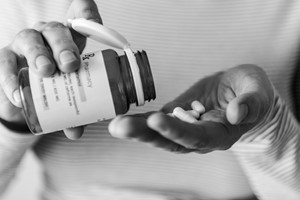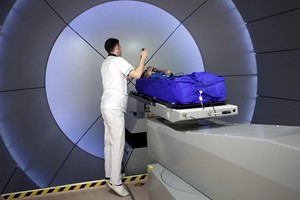Monkeypox is a rare disease caused by infection with the monkeypox virus. The virus is related to but distinct from the ones that cause smallpox and cowpox. Monkeypox is a notifiable disease in England.
There are 2 genetic clades of monkeypox virus: West African and Central African. The West African clade is usually associated with milder disease than the Central African clade.
Spread of monkeypox may occur when a person comes into close contact with an infected animal or an infected human. It may also occur when a person comes into close contact with material contaminated with the virus (for example bedding).
Most individuals experience a mild illness, with spontaneous and complete recovery within 3 weeks. However, severe illness can occur and sometimes results in death. The risk of severe disease is higher in children, pregnant women, and immunosuppressed individuals.
In May 2022, 3 separate incidents of the West African monkeypox clade in the UK were identified. The first was a recognized travel-associated case from Nigeria with no further spread.
The second incident was not related to travel and therefore likely to have been acquired through local transmission in the UK with spread limited to the same household.
The third incident remains under active investigation and there is ongoing transmission primarily in gay, bisexual, and other men who have sex with men (GBMSM). Cases within the GBMSM population have largely been located in the London area. Illness appears to be generally mild, consistent with previous experience with the West African clade.
This is the first time that chains of transmission have been reported in Europe without known epidemiological links to West or Central Africa.
There has been a rapid response from the UK Health Security Agency (UKHSA) in testing and confirming suspected cases, tracing contacts and issuing urgent advice in the clinical management of cases and contacts. In addition, UKHSA has been working closely with the Joint Committee on Vaccination and Immunization (JCVI) on the role of vaccine to prevent further cases and limit ongoing spread.
On 25 May 2022, the JCVI met to discuss and provide their advice on vaccination against monkeypox in the context of the ongoing outbreak.
Vaccine
There is currently no vaccine licensed in the UK or Europe for immunization against monkeypox. As monkeypox is related to the virus which causes smallpox, vaccines developed for smallpox are considered to provide cross-protection against monkeypox.
Smallpox Modified Vaccinia Ankara – Bavarian Nordic (MVA-BN) is currently distributed under 2 brand names, although it is the same vaccine.
The brand names are:
- Imvanex – approved by the Medicines and Healthcare products Regulatory Agency (MHRA) in the UK (and the European Medicines Agency in the EU) for the prevention of smallpox. Although this vaccine is not specifically licensed for the prevention of monkeypox in Europe, it has been used in the UK in response to the current and previous incidents
- Jynneos – approved by the Food and Drug Administration (FDA) in the US for the prevention of monkeypox as well as smallpox
There is very limited evidence on whether MVA-BN can prevent or modify disease when given to contacts after possible exposure to the monkeypox virus.
As some immunological response to the first dose of vaccine can be seen within the first 2 weeks, it is considered that rapid vaccination may modify disease severity for cases that may have longer incubation periods.
Prior to this ongoing outbreak, it was recommended that the MVA-BN vaccine should be offered to laboratory workers routinely handling material potentially infected with orthopox viruses, and to healthcare staff expected to provide care to monkeypox cases or who may be exposed to materials contaminated with virus.
Pre-exposure vaccination
Targeted pre-exposure vaccination
JCVI proposed that vaccination should be offered as soon as feasible to GBMSM at highest risk due to a large number of contacts.
The committee agreed that GBMSM at highest risk could be identified amongst those who attend sexual health services, using markers of high-risk behavior similar to those used to assess eligibility for HIV pre-exposure prophylaxis (PrEP), but applied regardless of HIV status. These risk criteria would include a recent history of multiple partners, participating in group sex, attending sex on premises venues or a proxy marker such as recent bacterial STI (in the past year).
In view of the current epidemiology and vaccine supply available, wider vaccination in low risk GBMSM individuals or the general population is not advised at this time.
Occupational vaccination
Pre-exposure vaccination should also be prioritized for the following workers at high risk of exposure:
- staff expected to provide care to monkeypox cases in high consequence infectious disease (HCID) units
- staff in sexual health clinics designated to assess suspected cases
- staff in additional hospitals outside HCID units designated to care for monkeypox patients
- workers in laboratories where pox viruses (such as monkeypox or genetically modified vaccinia) are handled, and others whose work in specialist and reference laboratories
- staff regularly undertaking environmental decontamination around cases of monkeypox
Other healthcare staff should be able to avoid inadvertent exposure by ensuring suspected monkeypox cases are assessed by designated staff, or by wearing appropriate personal protective equipment.
First doses should be prioritized during this outbreak, with the offer of a second dose for those who continue to be at an increased risk of exposure.
Post-exposure vaccination
There is very limited evidence on the effectiveness of post-exposure vaccination using MVA-BN, and therefore vaccine should be prioritized for those most likely to benefit. This would be based on timeliness of vaccination following exposure and for individuals at higher risk of severe disease following infection.
It is recommended that post-exposure vaccination of high-risk community or occupational contacts is offered ideally within 4 days of exposure, although may be offered up to 14 days in those at ongoing risk, or those who are at higher risk of the complications of monkeypox.
Those at higher risk of complications include:
- children under the age of 10 to 11 (school year 6 in England and Wales, year 7 in Northern Ireland and year P6 In Scotland)
- people who are pregnant
- individuals with immunosuppression (as defined in the Green Book)
This advice is given within the context of the current epidemiological situation in the UK, where disease is typically mild, and transmission is predominately occurring within the GBMSM population. It is also given with the consideration that vaccine supply is limited.
The UKHSA advice and guidance will be kept under review as the outbreak develops, with JCVI consulted where appropriate. UKHSA will also evaluate the impact of vaccination on the outbreak.
Conclusions and advice
Based on the currently available vaccine supply and advice from JCVI, UKHSA recommends that the available doses of MVA-BN vaccine should be used as a selective vaccine strategy with the aim of interrupting transmission in the subset of individuals at increased risk.
The JCVI concluded that this would be the best way to bring the current outbreak under control.
From: UK Health Security Agency













